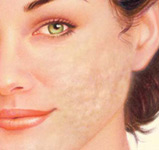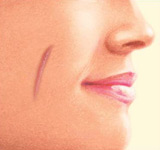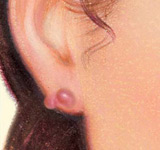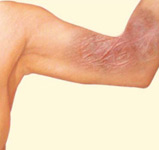Scar revision is plastic surgery performed to improve the condition or appearance of a scar anywhere on your body.
Source: http://www.plasticsurgery.org
The different types of scars include:
Discoloration, surface irregularities and other more subtle scars can be cosmetically improved by surgery or other treatments recommended by your plastic surgeon. These types of scars do not impair function or cause physical discomfort and include acne scars as well as scars resulting from minor injury and prior surgical incisions.

Hypertropic scars are thick clusters of scar tissue that develop directly at a wound site. They are often raised, red and/or uncomfortable, and they may become wider over time. They can be hyperpigmented (darker in color) or hypopigmented (lighter in color).

Keloids are larger than hypertropic scars. They can be painful or itchy, and may also pucker. They extend beyond the edges of an original wound or incision. Keloids can occur anywhere on your body, but they develop more commonly where there is little underlying fatty tissue, such as on the face, neck, ears, chest or shoulders.

Contractures are scars that restrict movement due to skin and underlying tissue that pull together during healing. They can occur when there is a large amount of tissue loss, such as after a burn. Contractures also can form where a wound crosses a joint, restricting movement of the fingers, elbows, knees or neck.
The type of scar you have will determine the appropriate techniques your plastic surgeon will use to improve your scar.


No comments:
Post a Comment